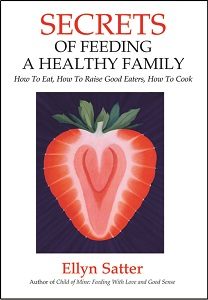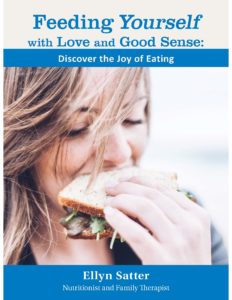

Family Meals Focus
The Ellyn Satter Institute Newsletter
Are you tired of feeling bad about your eating?
by Ellyn Satter, MS, MSSW. Dietitian and family therapist.
Click here for a PDF of this newsletter
Another New Year! A year ago, did you resolve to address your weight, eat healthier, not eat so much, not eat fast food. Did it work? Or did it just make you feel bad when you failed still again? Consider the possibility that the problem is the resolutions, not you! How about a resolution to discover the joy of eating? You can enjoy your eating and achieve your wellness goals at the same time. Feed yourself faithfully and give yourself permission to eat. Go with your natural and entirely respectable desire to get enough to eat of food you enjoy, rather than trying to fight against it. Even though they don’t worry about what and how much to eat, the evidence shows that Competent Eaters have higher-quality diets, better lab tests, are more active, sleep better, and even are more trusting and capable with themselves and other people.
How to Eat
Part one, “How to Eat,” in Secrets of Feeding a Healthy Family, tells you how to feel good about your eating at the same time as you achieve your health goals. The 40+-page booklet, Feeding Yourself with Love and Good Sense, shows you how. Are you too busy to read? Here is the condensed version:
Adjust your attitude
- You don’t have to punish yourself to eat well and be well. Instead, celebrate eating. Eating is okay. Eating enough is okay. Enjoying eating is okay. Eating what you like is okay. Taking time to eat is okay. Making eating a priority is OKAY.
- To do a good job with respect to feeding yourself and your family, build on enjoyment. Optimism, pleasure, and self trust are not only good motivators, you can keep on doing what is pleasant and rewarding. If it feels bad, you are unlikely to keep doing it.
- Don’t buy in to today’s negative attitudes about eating: “Food you like will kill you, if it tastes good it is bad for you, you shouldn’t eat . . . [put your demonized food here].” Avoiding food doesn’t make you healthier.
- When the joy goes out of eating, nutrition suffers.
Honor your appetite
You don’t have to punish yourself to be well. Instead, celebrate eating. Feed yourself faithfully and give yourself permission to eat.
Enjoy your food. What an alarming notion! Surely, wonder the food cops as well as the eaters, if we let ourselves enjoy food, we will simply go out of control, willy-nilly gobbling every morsel that comes across our voracious paths. Not true! Appetite works for us, not against us!
- Appetite is natural and life-giving. Appetite compels us to seek out food when supplies are low and famine around the corner.
- Appetite is strong and insistent, but it can be satisfied. It is normal to get enough to eat and to stop eating, even of food you just love!
- Appetite is satisfied when you start to lose interest. Food gradually – or suddenly – stops tasting as good. You can stop because you can have it again another time and will taste just as good.
Eat as much as you want
At regular meal- and snack-times, give yourself permission to eat as much as you want of food you enjoy. If you have been restricting yourself, this sounds like really alarming advice. Won’t you just gorge, meal after meal? And gain a lot of weight? That thinking forgets your body’s wisdom. Your body knows how much to eat. Learn to trust your body, and work with it rather than against it.
- Choose foods you enjoy and eat them in amounts you find satisfying.
- Pay attention to your food and to yourself while you eat.
- Stop eating when you get that “feeling of nuffness:” Food stops tasting as good and you feel relaxed.
Feed yourself faithfully
To feel good about your eating and trust your body to help you with the what and how much of eating, provide yourself with regular and reliable meals and snacks made up of food you enjoy in amounts you find satisfying. Think about it, are you casual about feeding yourself? Do you grab food when you happen to think about it? Do you eat desperately when hunger drives you to it? Do you absent-mindedly snack and nibble throughout the day? Here is how to take better care of yourself with food.
- Feed yourself reliably and well, go to some trouble to make food taste good, and take the time to tune in and enjoy your food.
- While feeding yourself requires effort and discipline, the discipline can—and must—be positive: setting up regular and predictable mealtimes, taking time to eat, eating food you enjoy.
- Avoid negative discipline: “If I made it, I should eat it.” “It isn’t good for me.” “That is way too fattening.” (Insert your guilt trip here.)
Back to the New Years’ resolutions
Will becoming Eating Competent let you become healthier? As I said at the beginning, pretty good chance. Even though they don’t worry about what and how much to eat, Eating Competent people do better. Will becoming Eating Competent make you lose weight? Probably not. But it will help prevent the stair-step weight gain that comes from going on still another diet, falling off, and regaining to an even higher weight level. Striving for weight loss is up to you, but consider what it will do to your joy of eating and your risk of gaining weight.
Explore
Understand and Apply ecSatter
Ellyn Satter’s Secrets of Feeding a Healthy Family says the secret of raising a healthy eater is to love good food, enjoy eating, and share that love and enjoyment with your child. When the joy goes out of eating, nutrition suffers.


